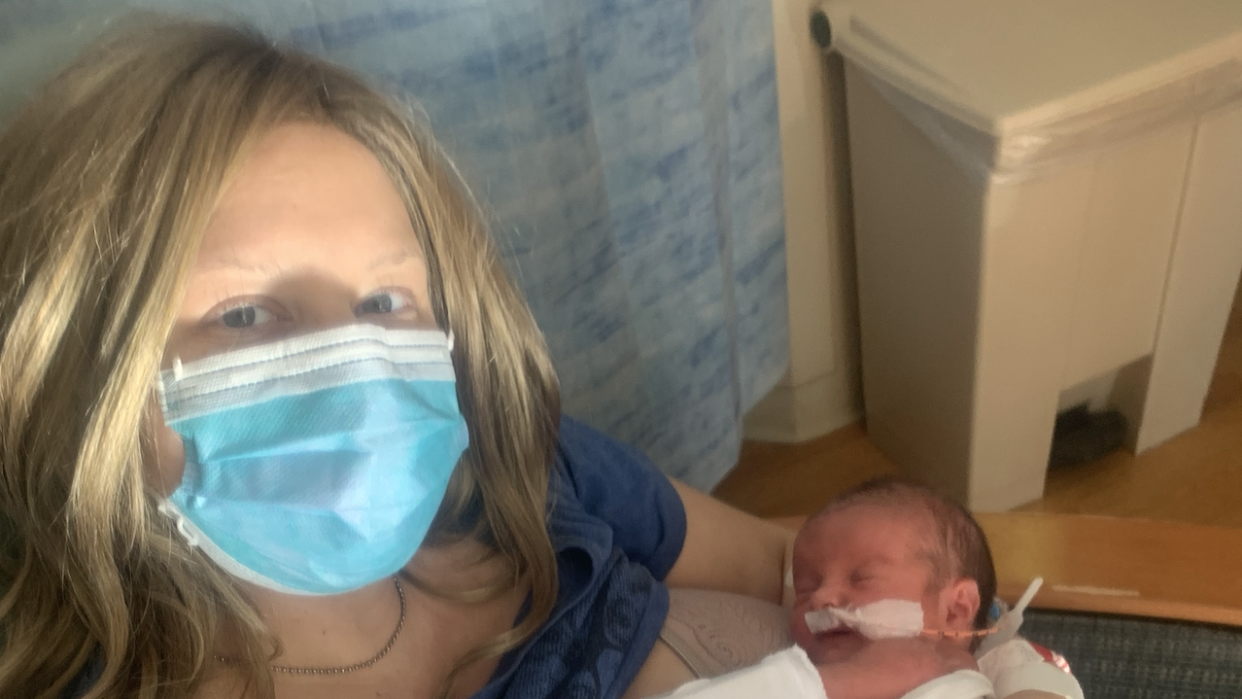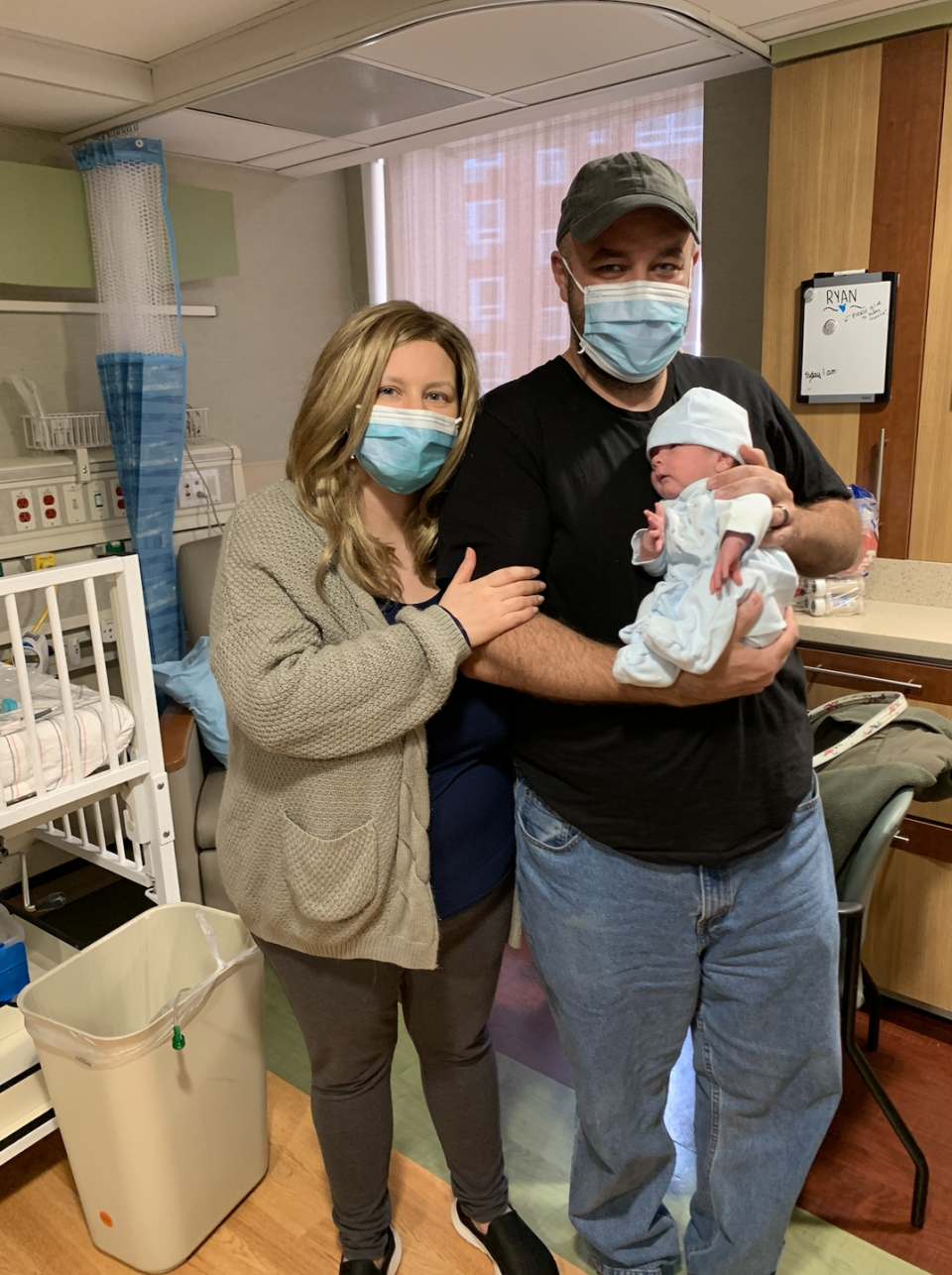‘I Thought I Had A Clogged Milk Duct From Breastfeeding. It Was Breast Cancer.’

In April 2021, I was finishing up pumping milk for my infant son, Lucas, when I felt a lump in my right breast. I had experienced one or two clogged milk ducts over the course of breastfeeding, so that’s what I assumed it was. I kept trying to get the clog out, but I couldn’t—it just wouldn’t go away and it was making me nervous—so I scheduled an appointment with my gynecologist. She felt the lump and said she thought it was a tissue change from breastfeeding, but she scheduled an ultrasound to be safe.
At the same time, I discovered I was pregnant again. It was a surprise! A week after I found out I was having another child, I went in for the ultrasound. The doctor didn’t see anything on the imaging and advised me to watch for any changes. The lump stayed the same for a while, then seemed to get a bit bigger. Two months later, in June, my right breast just exploded; it was about twice the size of my left breast. It felt engorged and was slightly painful.
I went back to my gynecologist and she assured me it was probably an engorgement or infection, but she ordered another ultrasound. After that round of imaging, the doctor referred me for a biopsy. I was terrified—not only was I pregnant but I also had a little son already. Then, right before the biopsy, I started to feel a lump by my armpit area. That made me really scared because, if it was cancer, it seemed to already be in my lymph nodes.
Of course, I was on Google like crazy. I’m a nurse, and I tell my patients not to do that, but I couldn’t help myself. I also noticed my nipple starting to invert.
In my gut I knew I had signs of breast cancer.
When I finally got the biopsy, I could tell by the radiologist's face that it was breast cancer.
The next day, I received the call that I had stage 3 hormone-positive and HER-2 positive breast cancer. (Knowing the specific type helps inform treatment options.)
It was the worst news of my life. I didn’t know what was going to happen with my pregnancy—I was 22 weeks along at that point—or how I would get chemo. I was scared I was going to die. And if I did make it through, would my baby? What if he was born early or still born? The worst part was not knowing if my son would survive all this stuff. I cried a lot.
Thankfully, before I even met my doctors—Marcella Fornari and Shilpi Gupta—they were already devising a treatment plan for me.
I started chemotherapy while pregnant, delivered my son, took a break, continued with chemo, then had a double mastectomy.
I had four rounds of chemotherapy before going into labor. The plan had been to induce me, but I actually started labor naturally at 33 weeks. My labor did stall briefly, which gave doctors the opportunity to give my son steroid medication to help his lung development. When I finally gave birth to my son, Ryan, I thought he would have a lot of issues, but he was perfect. It was the best moment of my life. With Ryan out safe, I could then focus on the treatment ahead.
I had 12 rounds of chemo, and I got a couple rounds of immunotherapy for the HER2-positive portion of my cancer. Then I had my double mastectomy. During the surgery, Dr. Fornari also removed the lymph nodes that had previously been positive for cancer, in order to test them while I was under anesthesia. The samples returned with no evidence of disease, so I didn’t need to have any more lymph nodes removed.
I had reconstructive surgery just recently called a DIEP flap, in which tissue is removed from the abdomen to reconstruct the breast, rather than using an implant. I also had my ovaries removed, and I’m on a hormone blocker. At 39 years old, I’m already in menopause, which sucks. After surgery, I also did five weeks of radiation.
I’m now cancer-free, even though I don’t like to say that.
My husband, Thiago, and I are always worried about jinxing it. I have good days and bad days. Some days I feel great, like nothing happened. And then other days, I feel a little down. And then other days, I feel a little overwhelmed, fatigued.
Luckily, I have a lot of support. My husband is wonderful and my parents are helpful. I talk to my friends all the time. And, of course, there are my kids. Ryan, my miracle baby, is now 2 years old; my oldest, Lucas, is 3.

When I look back on my experience, I wish I had been more aggressive after that first ultrasound. Something was there. And I do have a family history—my mom’s mom died of breast cancer in her 40s. I just hope that more women will listen to their bodies when they hear a story like mine. Always check. A number of my friends tell me that because of what happened with me, they check every month when they never did before.

Is there a connection between breast cancer and pregnancy?
Women who've given birth may be at a lower risk of developing breast cancer later in life, compared to women who have not, research has found. This is likely due to a few factors, including breast cell changes that continue until a first pregnancy and a reduction in the number of lifetime menstrual cycles and accompanying hormonal changes. Conversely, some research shows an increase in breast cancer risk in the 10 years right after giving birth, potentially because of hormone and breast changes during pregnancy.
But prior pregnancies (or not) are just one of many factors that must be considered when calculating a person's breast cancer risk, says Marcella Fornari, DO, breast oncology surgeon at Atlantic Breast Associates in New Jersey, who also treated Lauren.
As mentioned above, hormones (namely estrogen) seem to be a big piece of the puzzle. "We use what's called the Tyrer-Cuzick score, which takes into account the age at your first period, the age at menopause, if you're postmenopausal, what your mammographic density is, your height and weight, family history, and the age you had your first child," she explains. The more estrogen surges (i.e., menstrual cycles) a woman has over the course of her pre-menopausal years, the slightly higher her risk is of developing breast cancer, according to Dr. Fornari.
The same goes for later-in-life first pregnancies, as breast cells have had more time to grow and change. "One of the things that always makes me cringe when I have to say it is first pregnancy after the age of 30 technically increases your risk." But one factor is *not* protective or definitive over another, Dr. Fornari stresses. That's why it's so important to consider the totality of factors when you talk with your doc about your breast cancer risk.
You Might Also Like

